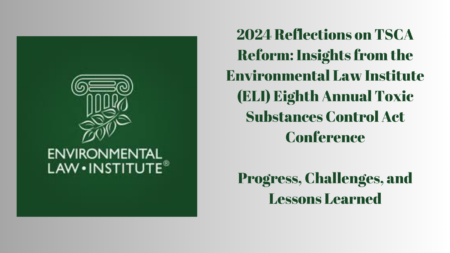Posted on June 25, 2024
Tomorrow,  on June 26, 2024, an eagerly anticipated event kicks off: The Eighth Annual Toxic Substances Control Act (TSCA) Conference, co-sponsored by the Environmental Law Institute (ELI), Bergeson & Campbell, P.C., and the George Washington University Milken Institute School of Public Health.
on June 26, 2024, an eagerly anticipated event kicks off: The Eighth Annual Toxic Substances Control Act (TSCA) Conference, co-sponsored by the Environmental Law Institute (ELI), Bergeson & Campbell, P.C., and the George Washington University Milken Institute School of Public Health.
This conference continues the tradition of reflecting on the progress and challenges since the implementation of the 2016 The Frank R. Lautenberg Chemical Safety for the 21st Century Act, providing a comprehensive overview of TSCA’s journey and current standing. ADAO had the honor of attending the pen-signing ceremony when then President Barack Obama signed the bill into law. At this ceremony, President Obama referenced the need for TSCA reform, given that the EPA failed to ban asbestos.
After working on TSCA reform for nearly 20 years, it will be wonderful to hear updates and connect with those doing exceptional public health and environmental policy work. The 2024 conference builds upon TSCA Reform – Seven Years Later, TSCA Reform – Six Years Later, TSCA Reform – Five Years Later, TSCA Reform – Four Years Later, TSCA: Three Years Later, TSCA Reform – 2 Years Later and TSCA Reform: One Year Later.
Setting the Stage
Madison Calhoun, Senior Manager of Educational Programs at ELI, will open the conference and set the tone for a day of robust discussions and critical reflections on TSCA’s evolution. The conference’s agenda is packed with insights from leading experts, focusing on hot topics such as risk management, risk evaluation, new chemical review, and the influential role of Section 21 citizens’ petitions.
Hot Topics in TSCA Litigation
The first scheduled panel of the day delves into the significant administrative and judicial litigation surrounding TSCA. Mark N. Duvall from Beveridge & Diamond, P.C. moderates a lively discussion with distinguished panelists, including Adam M. Kushner of Hogan Lovells US LLP, Tosh Sagar of Earthjustice, Robert M. Sussman of Sussman & Associates, and James Votaw of Keller & Heckman. They explore the implications of ongoing litigation, such as the Inhance Technologies case and challenges to EPA’s Section 6 risk management rule for asbestos.
Keynote Address: A Vision for the Future
A highlight of the morning will be the keynote address by Michal Ilana Freedhoff, Ph.D., Assistant Administrator of the Office of Chemical Safety and Pollution Prevention at the U.S. Environmental Protection Agency. Dr. Freedhoff will provide an in-depth perspective on the future of TSCA implementation, emphasizing the importance of scientific integrity and transparent decision-making in chemical safety. ADAO deeply respects EPA’s dedication to implementing the LCSA to protect public health.
Panel Discussions: Diving Deep into TSCA Provisions
Panel 1: Risk Management
Moderated by Karyn M. Schmidt of the American Chemistry Council, this panel will examine the first-ever risk management rule issued by the EPA. Discussions revolved around the criteria for defining the “extent necessary” to control unreasonable risks, circumstances under which EPA may refrain from banning a chemical use, and potential litigation issues. Insights will be shared by MaryAnn Hoff of PPG, Jonathan Kalmuss-Katz of Earthjustice, and Eileen Murphy, Ph.D., from the EPA.
Panel 2: Risk Evaluation and Supporting Roles of Sections 4 and 8
Maria J. Doa, Ph.D., from the Environmental Defense Fund, will lead a panel exploring refining chemical prioritization and risk evaluation processes. Panelists, including David B. Fischer of Keller and Heckman LLP, Jeffery T. Morris, Ph.D., of EPA, and Tracey Woodruff, Ph.D., from the University of California, San Francisco, will discuss the roles of Sections 4 and 8 in generating and utilizing data for informed decision-making.
Panel 3: New Chemical Review
This panel, moderated by Samantha Liskow of the Environmental Defense Fund, will focus on the revisions and challenges in the new chemical review process. Shari Barash from the EPA, Kyla Bennett, Ph.D., from Public Employees for Environmental Responsibility, and other experts will discuss updates in the review process and efforts to streamline review times.
Panel 4: Shaping the Agenda through Section 21 Citizens’ Petitions
The final panel, moderated by Lynn L. Bergeson of Bergeson & Campbell, P.C., highlighted the increasing influence of Section 21 citizens’ petitions in shaping EPA’s regulatory priorities. Discussions included the utility of these petitions, their impact on policy, and other mechanisms for citizen engagement. Panelists included Ryan J. Carra, Ph.D., from Beveridge & Diamond, P.C., and Thomas Groeneveld from the EPA.
Concluding Remarks
Jordan Diamond, President of the Environmental Law Institute, will close the conference with reflections on the day’s discussions and the path forward for TSCA. The event will underscore the ongoing efforts and collaborations necessary to ensure chemical safety and protect public health.
Looking Ahead
As we reflect on the insights soon to be shared at the Eighth Annual TSCA Conference, it is evident that the journey of TSCA reform is far from over. The progress made since the 2016 Lautenberg Amendments is commendable, yet the challenges ahead call for continued vigilance, innovation, and stakeholder collaboration. This conference will serve as a crucial platform for fostering dialogue, sharing knowledge, and shaping the future of chemical safety regulation.
We have more work to do together; please join nearly 150,000 people and sign the petition to Ban Asbestos in the US Now, Without Loopholes or Exemptions, as we continue to champion prevention and shape policy, ensuring a safer and healthier environment for all.
Linda Reinstein
